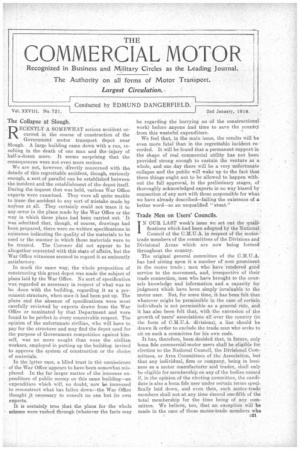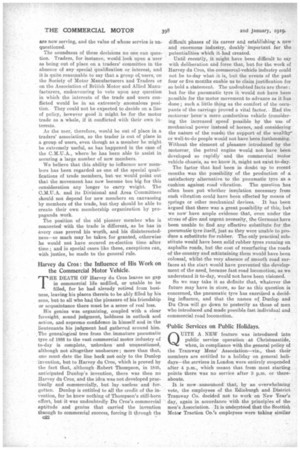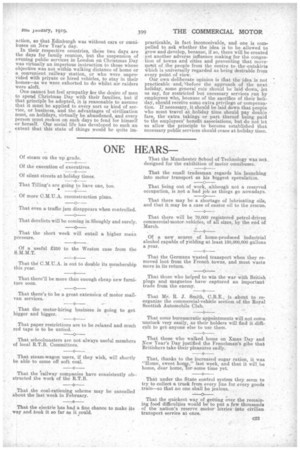The Collapse at Slough.
Page 1

Page 2

Page 3

If you've noticed an error in this article please click here to report it so we can fix it.
RECENTLY A SOMEWHAT serious accident occurred in the course of construction of the Government motor transport depot near Slough. A large building came down with a run, resulting in the death of one man and the injury of half-a-dozen more. It seems surprising that the consequences were not even more serious.
We are not, however, directly concerned with the details of this regrettable accident, though, curiously enough, a sort of parallel can be established between the incident and the establishment of the depot itself. During the inquest that was held, various War Office experts were examined. They were all quite unable to trace the accident to any sort of mistake made by anyone at all. They certainly could not trace it to any error in the plans made by the War Office or the way in which those plans had been carried out, ' It was admitted that, though, of course, drawings had been prepared, there were no written specifications in existence indicating the quality of the materials to be used or the manner in which those materials were to be treated. The Coroner did not appear to be altogether contented with this state of affairs, but the War Office witnesses seemed to regard it as eminently satisfactory.
In much the same way, the whole proposition of constructing this great depot was made the subject of plans laid by the War Office. No sort of specification was regarded as necessary in respect of what was to be done with the building, regarding it as a per manent structure, when once it had been put up. The plans and the absence of specifications were most carefully reviewed by experts drawn from the War Office or nominated by that Department and were found to be perfect in every conceivable respect. The opinion of the unfortunate civilian, who will have to .
pay for the structure and may find the depot used for the purpose of Government competition against him self, was no more sought than were the civilian workers, employed in putting up the building_ invited to approve the system of construction or the choice of materials.
In the latter case, a blind trust in t14 omniscience of the War Office appears to have been somewhat mis placed. In the far larger matter of the immense ex penditure of public money on this same building—an expenditure which will, no doubt, now be increased to reconstruct what has fallen down—the War Office thought it necessary to consult no one but its own experts.
It is certainly true that the plans for the whole seheme were rushed through (whatever the facts may be regarding the hurrying on of the constructional work) before anyone had time to save the country from this wasteful expenditure.
We feel that, in the main issue, the results will be even more fatal than in the regrettable incident recorded. It will be found that a permanent support in the shape of real commercial utility has not been provided strong enough to sustain the venture as a whole, and one day there will be a very unfortunate collapse and the public will wake up to the fact that these things ought not to be allowed to happen without the full approval, in the preliminary stages, of thoroughly acknowledged experts in no way biased by connection of any sort with those responsible for what' we have already described—failing the existence of a better word—as an unqualified "stunt."
Trade Men on Users' Councils.
IN OUR LAST week's issue we set out the qualifications which had been adopted by the National Council of the C.M.U.A. in respect of the motor-" trade members of the committees of the Divisions and Divisional Areas which are now being formed throughout the country.
The original general committee of the C.M.U.A.
has had sitting upon it a number of men prominent in the motor trade ; men who have rendered good service to the movement, and, irrespective of their trade connection, men who have brought to the COMIsels knowledge and information and a capacity for judgment which have been simply invaluable to the motor user. But, for some time, it has been felt that whatever might be permissible in the case of certain individuals is not permissible as a general rule, and it has also been felt that, with the extension of the growth of users' associations all over the country (in' the form of C.M.U.A. divisions), a line should be drawn iii order to exclude the trade man who seeks to sit on such a committee for his own ends.
It has, therefore, been decided that, in future, only bona fide commercial-motor users shall be eligible for election to the National Council, the Divisional COM mittees, or Area Committees of the Association, but that any individual, firm or company, being in busi ness as a motor manufacturer and -trader, shall only be eligible for membership on any of the bodies named if, in the opinion of the electing committee, the candi date is also a bona fide user under certain terms speci fically laid down, and even then, suth motor-trade members shall not at any time exceed one-fifth of the total membership for the time being of any committee. We believe, too, that an exception will be made in the case of those motor-trade members who c21 are now serving, and the value of whose service is unquestioned.
The soundness of these decisions no one can question. Traders, for instance, would look upon a user as being out of place on a traders' committee in the absence of any special qualification or interest, and it is quitaxeasonable to say that a group of,users, on the Society of Motor Manufacturers and Traders or on the Association of British Motor and Allied Manufacturers, endeavouring to vote upon any question in which the interests of the trade and users conflicted would be in an extremely anomalous position. They could not be expected to decide on a line of policy, however good it might be for the motor trade as a whole, if it conflicted with their own interests.
As the user, therefore, would be nut of place in a traders' association, so the trader is out of place in a group of users, even though as a member he might be extremely useful, as has happened in the ease of the C.M.U.A., where he has been able to assist in securing a large number of new members.
We believe that this ability to influence new members has been regarded as one of the special qualifications of trade members, but we would point out that the movement has now became too big for this consideration any longer to carry weight. The C.II.U.A. and its Divisional and Area Committees should not depend for new members on canvassing by members of the trade, but they should be able to create their own membership organization by pro paganda work. .
The position of the old pioneer member who is connected with the trade is different, as be has in every case proved his worth, and his disinterestedness—so much may be taken for granted, otherwise he would not have secured re-election time after time ; and in special cases like these, exceptions can, with justice, be made to the general rule.
Harvey du Cros: the Influence of His Work on theCommercial Motor Vehicle.
THE DEATH OF Harvey du Oros leaves no gap in commercial life unfilled, or unable to be filled, for he had already retired from business, leaving his places therein to be ably filled by his sons, but to all who had the pleasure of his friendship or acquaintance there must be .a sense of real loss.
His genius was organizing, coupled with a clear foresight, sound judgment, boldness in outlook and action, and supreme confidence in himself and in the lieutenants his judgment had gathered around him. . The genealogical tree from the immature pneumatic tyre of 1888 to the vast commercial motor industry of to-day is complete, unbroken and unquestioned, although not altogether unobscure ; more than that, one must date the line back not only to the Dunlop invention, but to Harvey du Oros, which is proved by the fact that, although Robert Thompson, in Thee, anticipated Dunlop's invention, there was then no Harvey du Oros, and the idea was not developed practically and commercially, but lay _useless and forgotten. Dunlop is entitled to all the credit of the invention, for he knew nothing of Thompson's still-born effort, but it was undoubtedly Du Cros's commercial aptitude and genius that carried the invention through to commercial success, forcing it through the G22 _ difficult phases of its career and establishing a. new and enormous industry, doublyimportant for the potentialities which it had created.
Until recently, it might have been difficult to say with deliberation and force that, but for the work of Harvey du Gros, the commercal-vehiele industry could not be to-day what it is, but the events of the past four or five months enable us to claim justification for 80 bold a statement. The undoubted facts are these: but for the pneumatic tyre it would not have been possible for the motor movement to advance as it haa done ; such a little thing as the comfort of the occupants of the carriage proved a vital factor.. Had the motorcar beena mere comfortless vehicle (considering the increased speed possible by the use of mechanical power instead of horses, and considering the nature of the roads) the support of the wealthyor well-to-do people would not have been forthcoming. Without the element of pleasure introduced by the motorcar, the petrol engine would not have been developed so raPidly and the commercial motor vehicle chassis, as we know it, might not exist to-day.
The factor that had been in doubt up to recent months was the possibility of the production of a satisfactory alternative to the pneumatic tyre as a cushion against road vibration. The question has often been put whether insulation necessary from such vibration could have been effected by means of springs or Other mechanical devices. It has been argued that there was a great possibility of this, but we now have ample evidence that, even under the stress of dire and urgent necessity, the Germans have been unable to find any effective substitute for the pneumatic tyre itself, just as they were unable to produce a substitute for rubber. The only practical substitute would have been solid rubber tyres running on asphalt° roads, but the cost of resurfacing the roads of the country and meintaining them would have been colossal, whilst the very absence of smooth road surfaces at the start would have prevented the development of the need, because fast road locomotion, as we understand it-to-day, would not have been visioned.
So we may take it as definite that, whatever the future may have in. store, so far as thia question is concerned, the pneumatic tyre has exercised a deciding influence, and that the names of Dunlop and Du Oros will go down to posterity as those of men who introduced and made possible fast individual and commercial road locomotion.
'Public Services on Public Holidays.
QUITE A NEW feature was introduced into public service operation at Christmastide, when, in compliance with the general policy of the Tramway Mens' Association—viz., that their members are entitled to a holiday on general holidays—the services in London were entirely suspended after 4 p.m., which meant that from most starting points there was no service after 3 p.m. or thereabouts.
It is now announced that, by an overwhelming vote, the employees of the Edinburgh and District Tramway Co_ decided not to work on New Year's day, again in accordance with the principles of the men's Association. It is understood that the Scottish Motor Traction Co.'s employees were taking similar action, so that Edinburgh was without cars or omnibuses on New Year's day. In their respective countries, these two days are the days for family reunion, but the suspension of evening public services in London on Christmas Day was virtually an imperious instruction to those whose objective was not within walking distance of home or a convenient railway station, or who were unprovided with priyate or hired vehicles, to stay in their homes—as we were exhorted to do whilst air raiders were aloft.
One cannot but feel sympathy for the desire of men to spend Christmas Day with their families, but if that principle be adopted, it is reasonable to assume that it must be applied to every sort or kind of service, or business, and the advantages of civilization must, on holidays, virtually be abandoned, and every person must reckon on such days to fend for himself or herself. Our social life has developed to such an extent that this state of things would be quite im practicable, in fact inconceivable, and one is compelled to ask whether the idea is to be• allowed to grow and develop, because, if so, there will be created yet another adverse influence making for the congestion of towns and cities and preventing that movement of, the people from the centre to the 'outskirts which is universally regarded as being desirable from every point of view.' Our own deliberate opinion is that the idea is not practicable and, 'before the approach of the next holiday, some general rule should be laid down, let us say, for restricted but necessary services run by employees who, because of the sacrifice of their holiday, should receive some extra privilege or compensation. If necessary, it should be laid down that people who must travel at holiday time should pay double fare, the extra takings or part thereof being paid to the employees' benefit associations, but do not let us allow the principle to become established that necessary public services should cease at holiday time.






















